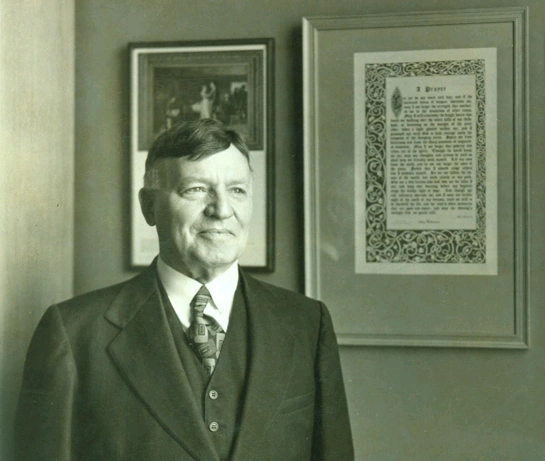Max Ehrmann (1872-1945) was an American writer, best known for his prose poem “Desiderata” (1927). Born in Terre Haute, Indiana, he pursued a career in law before turning to writing. While Ehrmann wrote many works, it’s “Desiderata,” with its wise and calming advice, gained posthumous fame in the 1960s and remains popular today. Its message promotes peace, love, and understanding, emphasizing personal contentment and the intrinsic value of every individual. Ehrmann’s other works, though lesser-known, also reflect his philosophical and spiritual contemplations.
Overview of “Desiderata”
“Desiderata,” which is Latin for “things desired,” is a prose poem penned by Max Ehrmann in 1927. It offers a set of guidelines for living a fulfilling, peaceful, and loving life. The poem’s lines impart wisdom about maintaining inner peace, fostering good relationships, being true to oneself, and recognizing the interconnectedness of the universe.
Analysis of “Desiderata”
- Seeking Balance and Calm: The poem opens with the advice to “Go placidly amid the noise and haste.” Ehrmann suggests that serenity can be achieved even in a chaotic world if one maintains inner calm and balance.
- Relationships and Communication: Ehrmann emphasizes listening over speaking and encourages understanding and avoiding loud and aggressive individuals, as they can disturb one’s tranquility.
- Self-worth and Comparison: The poem advises against comparing oneself with others, as this can lead to either vanity or bitterness. Every person has their journey and inherent value.
- Career and Ambition: Ehrmann touches on the importance of keeping a healthy perspective on one’s career. He suggests pursuing one’s aspirations with vigor but without losing the essence of oneself for mere materialistic pursuits.
- Acceptance of Life’s Challenges: The poem acknowledges the inevitability of dark periods in life but counsels patience, as even these challenging times have their purpose.
- Connecting with the Universe: Ehrmann beautifully encapsulates the idea that humans are a part of the vast cosmos, suggesting a deeper spiritual interconnectedness.
- End Message: The closing lines summarize the poem’s essence – that the world, despite its sham, drudgery, and broken dreams, is still beautiful and that one should strive to be at peace with God, whatever one perceives Him to be.
In essence, “Desiderata” stands as a timeless message of hope, perseverance, and the pursuit of a life lived in harmony with oneself and the world. The poem has been embraced by readers globally, often turning to its words for guidance and solace in turbulent times.
Desiderata: Original Text
This is the original text from the book where Desiderata was first published.
Go placidly amid the noise and the haste, and remember what peace there may be in silence. As far as possible, without surrender, be on good terms with all persons.
Speak your truth quietly and clearly; and listen to others, even to the dull and the ignorant; they too have their story.
Avoid loud and aggressive persons; they are vexatious to the spirit. If you compare yourself with others, you may become vain or bitter, for always there will be greater and lesser persons than yourself.
Enjoy your achievements as well as your plans. Keep interested in your own career, however humble; it is a real possession in the changing fortunes of time.
Exercise caution in your business affairs, for the world is full of trickery. But let this not blind you to what virtue there is; many persons strive for high ideals, and everywhere life is full of heroism.
Be yourself. Especially do not feign affection. Neither be cynical about love; for in the face of all aridity and disenchantment, it is as perennial as the grass.
Take kindly the counsel of the years, gracefully surrendering the things of youth.
Nurture strength of spirit to shield you in sudden misfortune. But do not distress yourself with dark imaginings. Many fears are born of fatigue and loneliness.
Beyond a wholesome discipline, be gentle with yourself. You are a child of the universe no less than the trees and the stars; you have a right to be here.
And whether or not it is clear to you, no doubt the universe is unfolding as it should. Therefore be at peace with God, whatever you conceive Him to be. And whatever your labors and aspirations, in the noisy confusion of life, keep peace in your soul. With all its sham, drudgery and broken dreams, it is still a beautiful world. Be cheerful. Strive to be happy.
by Max Ehrmann ©1927
